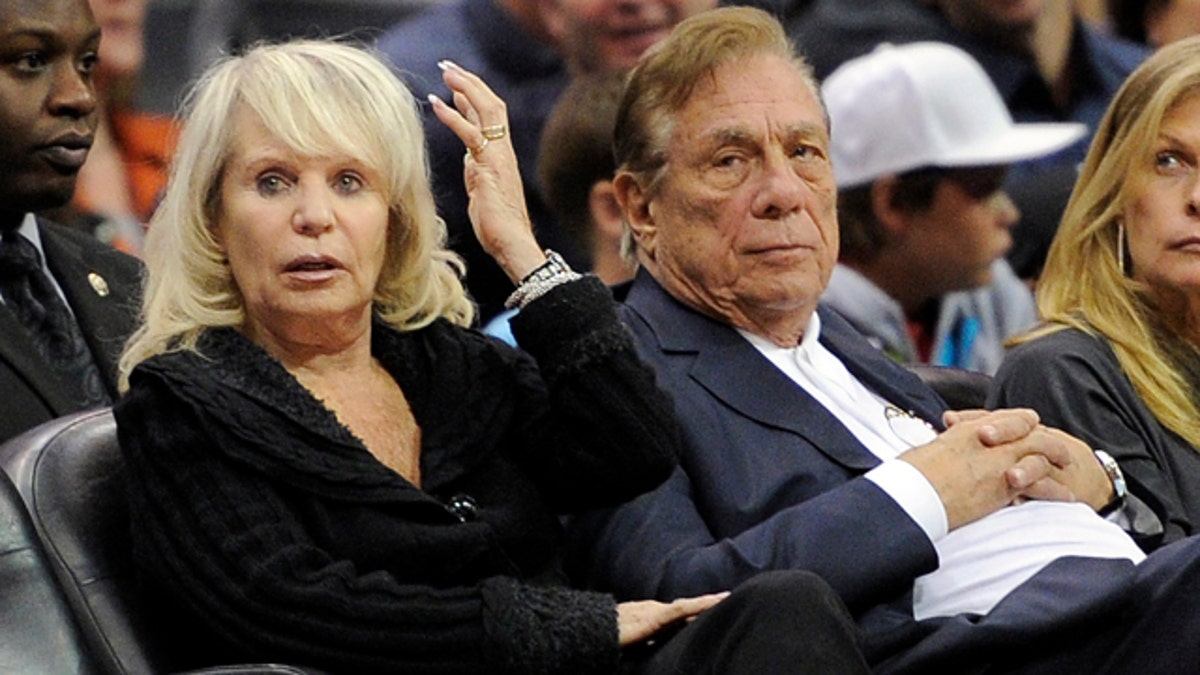
Nov. 12, 2010: Shelly Sterling sits with her husband, Donald Sterling, right, during the Los Angeles Clippers' NBA basketball game against the Detroit Pistons in Los Angeles. (AP/Mark J. Terrill, File)
LOS ANGELES – With the potentially record-breaking $2 billion sale of the Los Angeles Clippers hanging in the balance, a trial beginning Monday will focus on whether Donald Sterling's estranged wife had the authority under terms of a family trust to unilaterally negotiate the deal.
Shelly Sterling struck a deal to sell the Clippers to former Microsoft CEO Steve Ballmer after Donald Sterling's racist remarks to a girlfriend were publicized and the NBA moved to oust him as team owner.
In order to do so, she had two doctors examine her 80-year-old husband and they declared him mentally incapacitated and unable to act as an administrator of The Sterling Family Trust, which owns the Clippers.
The terms of the trust say incapacitation can be determined by two licensed doctors without ties to the family who are specialists in their field. A trustee must cooperate with such exams.
The judge must find that Shelly Sterling acted in accordance with the trust and that the deal still applies -- even though the trust has since been revoked by Donald Sterling -- for the sale to proceed.
Donald Sterling's attorneys say that his wife "blindsided" him and he submitted to examinations under false pretenses. They allege there was undue influence in the doctors' findings, and that the exams and letters regarding his mental capacity were defective and incomplete.
They say that if he'd been properly informed, he would have participated at a more convenient time instead of being pulled out of legal meetings.
"He would have also eaten properly and have been well rested for the examinations and focused on taking the exam with the full and complete understanding what it was for and the serious nature of the exam," they wrote in filings.
But Shelly Sterling's attorney, Pierce O'Donnell, said that Donald Sterling voluntarily went to take scans of his brain and there was no requirement to remind Donald Sterling, who is an attorney, or his legal team of the trust's conditions.
The trial will also focus on the question of what happens to a deal that hasn't been closed once a trust is revoked. Donald Sterling revoked the trust on June 9 -- weeks after Shelly Sterling negotiated the deal with Ballmer.
Shelly Sterling's attorneys also contend that finishing the deal is part of "winding down" the trust's affairs and that she has an obligation to close or Ballmer will sue.
Donald Sterling's attorneys argue that the probate court now lacks jurisdiction and that winding down affairs refers to passive actions, not a sale that markedly changes the assets in the trust and its value.
Donald Sterling's attorneys made a late move last week to shift the case to federal court so their allegations of medical privacy violations in the probate case can be heard.
Attorneys for both Shelly Sterling and Ballmer called the filing a "desperate" tactic that they would seek to block.
It was not immediately clear when a federal judge would rule on the filing or how it would affect the probate proceedings, but the trial remained on schedule to start Monday morning.
Whatever happens, timing is tight. NBA owners must approve what would be a record-breaking deal and are scheduled to meet July 15 to vote.
That's the same day Ballmer's offer is set to expire -- and there is no deal without the judge's approval of the sale.
If the sale isn't completed by Sept. 15, the league said it could seize the team and put it up for auction.
